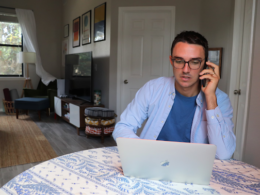The Best Financial Performer for the 2007 StartupNation Home-Based 100 isn’t exactly a small business, unless you consider a 10,000-person network of workers small. But Medical Solutions International (MSI), originally founded in 1987, is indeed a home-based enterprise, proving that you don’t have to think small when planning a business out of your home. The company, a staffing service that places nursing professionals in hospitals around North America, England, and Ireland, has its headquarters out of CEO Robert Woltz’s Tempe, Ariz., home. Woltz has five full-time staffers that also are home-based, in locations sprinkled around the United States.
MSI has established relationships with many hospitals over the years, and provides nurses to medical facilities around the country on a 13-week contract basis. Since the health-care industry currently has such a high demand for qualified workers, MSI is able to place nurses in preferred geographic locations, which the nurses love. For example, if Miami during the winter sounds appealing, the company tries to find hospitals there looking for nursing help. Napa Valley in the springtime? No problem, MSI will go to bat for you.
“They’re demanding,” Woltz says of the nurses. “But we accommodate their needs.”
MSI also has 11 outsourced, contract employees around the country, from former executives to stay-at-home moms, who work on commission and serve as recruiters for potential nursing candidates. Out of the network of 10,000 nurses who have applied for positions through the company’s Web site, MSI regularly works with about 560 on an ongoing basis.
Woltz’s strategy of keeping employees and operational overhead to a minimum is entirely deliberate. “It’s easy to do it this way as long as you do it right,” Woltz says of his company’s virtualization.
He pays the nurses well—between $45 and $50 per hour—and gives them health care, 401(k) plans, and a number of other benefits. Woltz likens the business to a manufacturing company with high headcount responsibilities. But MSI turns a profit by charging fees to hospitals for placing and administrating each and every nurse in their facility. Luckily, he says, hospitals pay him quickly, with a 22-to-28-day turnaround on receivables.
He must be doing something right. MSI’s revenues have tripled over the last two years, to $11.2 million.
But MSI wasn’t always run this way.
When Woltz acquired the business in 1991 with a $500,000 loan from his cousin, it was run out of conventional, corporate offices. The operation quickly lost money, and Woltz’s initial investment dwindled away. The overhead of paying for office expenses nearly brought down the business.
“It just didn’t fly,” Woltz recalls. “We lost so much money so quickly. I said, ‘Enough of this crap. We have to develop a more efficient plan.’” That’s where the concept of running the business from home took shape.
The transition wasn’t easy. But over three years and a re-mortgage of his home, Woltz was able to cut costs dramatically. “It flipped us,” he says of the turnaround. The company was able to breakeven and eventually become profitable.
Now the house Woltz shares with his wife Elena, a physician and MSI’s compliance director of the nurse-screening process, is a virtual fortress. And the technology that goes into running the MSI operation will make your head spin.
The main office is located in their living room, where there are two computers loaded with state-of-the-art software. The den, which serves as the recruiting office, houses a high-speed duplex color printer where they print brochures without having to pay outsourcing costs. They have five servers in their laundry room with a T-1 line (and a second one on the way) for high-speed, high bandwidth internet access. Woltz is also an independent software vendor for Microsoft and, as part of the software giant’s small-business partnership program, he develops his own programs on its operating platform.
He also uses a hardware-free, virtual phone system called RingCentral, which allows him to receive calls to his main business number on his cellular or any phone he desires. We know – we called his main number many times to interview him, fact check, and just absorb the enormity of his success. Each time we reached him he was in a different city.
“Without the technology, you could try it, but it wouldn’t succeed,” Woltz says of his operation. Technology, by the way, is also the costliest part of his business, with his Microsoft SQL 2005 software alone pricing at $40,000.
Other than technology, Woltz credits his success to surrounding himself with the right people with experience from everything to the nursing field to human resources.
“I try to hire people who are much smarter than I am,” he says.
Before taking on his venture, Woltz also spoke with many small-business experts, including Atlanta entrepreneur J.K. McDonald, before taking giant steps.
At this phase in his career, Woltz is now willing to impart some wisdom to those looking to start their own home-based enterprises.
For funding, Woltz suggests initially trying to get cash from relatives or friends, stressing that banks are not likely to deal with smaller startups. But he warns about setting expectations properly: “Don’t over promise. You may lose.”
Woltz also points to the importance of making cash-flow assessments and planning carefully how much money will flow in and out of your business.
“In any home business you really have to look at the costs and be realistic with yourself,” he advises. Like the simple question you must be able to answer, “How long can I survive without being paid?”
So what are MSI’s next big business steps? Woltz is looking at expanding the company’s international operations and possibly moving into Japan, which also has a competitive nursing market. But he’s in no rush.
“We have enough work in our current markets,” he says, “and it keeps expanding.”
More featured 2007 StartupNation Home-based 100 articles:
- HB 100: We shine the spotlight on home-based entrepreneurs
- Boomer winner ‘lured’ into a home business
- Best Financial Performer runner-up writes, sells, soars
- Child Shield innovates to save children
- One person’s grunge is another person’s livelihood
- Snoloha proves slackers can cash in too
- Nashville Lappy Hour gets wacky with dogs and drinks
- Sweet Onion Creations sweetens its business by going green
View complete 2007 rankings
See 2008 Home-Based 100 Competition





